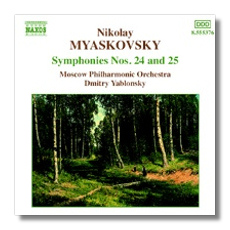
The Internet's Premier Classical Music Source
Related Links
- Myaskovsky Reviews
- Latest Reviews
- More Reviews
-
By Composer
-
Collections
DVD & Blu-ray
Books
Concert Reviews
Articles/Interviews
Software
Audio
Search Amazon
Recommended Links
Site News
 CD Review
CD Review
Nicolai Myaskovsky

Late Symphonies
- Symphony #24
- Symphony #25
Moscow Philharmonic Orchestra/Dmitry Yablonsky
Naxos 8.555376 DDD 66:07
If Naxos is on the road to a Myaskovsky symphony cycle, they've got many miles to go: Myaskovsky wrote twenty-seven of them. Perhaps this disc is a just one-off, but even if it is, it's a good one, and opportune, because I'm not sure if these two late symphonies (written in the 1940s) have been recorded before. If they have been, those recordings obviously are not easy to find and are probably out of print.
Myaskovsky was born in 1881 near Warsaw – his father was in the military – and he began his formal studies in music at the relatively late age of 25; his teachers at the St. Petersburg Conservatory were Liadov and Rimsky-Korsakov. Early in his maturity, he dabbled a little in the important musical styles of his era, but in his later works, harmonic consonance largely holds sway. In the two symphonies recorded here, Myaskovsky's language is undoubtedly less difficult than Prokofieff's and Shostakovich's, for example, but he is hardly less interesting. One wonders why Myaskovsky's conservative works fell under censure in 1948, during the Zhdanov attacks. In any event, the composer was badly shaken during this era, which probably hastened his death in 1950.
Symphony #24 is subtitled, "To the memory of Vladimir Derzhanovsky," a friend and musicologist. A second death – that of Sergei Rachmaninoff – also may have lent a darkly elegiac color to the second movement of this symphony. The first movement opens with a striking fanfare, and fanfares return in the otherwise peaceful finale, and overall, the mood is heroic, but without militarism or Soviet bombast. Myaskovsky saves his grief for the Rachmaninoff-like Molto sostenuto central movement, which rises twice to a searing climax. I think most listeners will eat it up, as I did.
The next symphony begins with an extended slow movement (shades of Shostakovich's Sixth), a moving set of variations on theme said to represent the Fatherland. Again, there is no sense of writing to please commissars or to follow a set political agenda; this music unmistakably comes from the heart. Over the next two movements, the tempo accelerates. The short Moderato is unaffectedly lyrical, and the Allegro impetuoso, while a little more ordinary, complements what has come before.
Conductor Yablonsky, the son of pianist Oxana Yablonskaya, immigrated to the United States in his teens and received much of his musical education at Yale. In the past few years, he frequently has returned to Russia, and is now the Principal Guest Conductor of the Moscow Philharmonic. In the1950s and 60s, Soviet orchestral recordings were characterized by their shallow engineering and unpleasant wind timbres. There's nary a trace of that here; this is a first-class production, and the performers play the music with affection. More Myaskovsky from Yablonsky and the Moscow Philharmonic would be very welcome!
Copyright © 2003, Raymond Tuttle




















